Grammys 2019 Recap: The Year of the Woman

There were a ridiculous amount of standout performances this year, and unsurprisingly all of them were helmed by women.
Sunday night was met with a bit of trepidation from Grammy viewers and musicians alike, given the tumultuous year the Recording Academy went through. Last year’s Grammy awards were deemed a failure by many for not acknowledging enough female artists – only one woman won a televised award that night, and Lorde, the only woman nominated for Album of the Year, was not offered a performance slot. When asked about the debacle shortly after the Grammys ended, Recording Academy president Neil Portnow said that if women want more recognition in the music industry, they needed to “step up.”
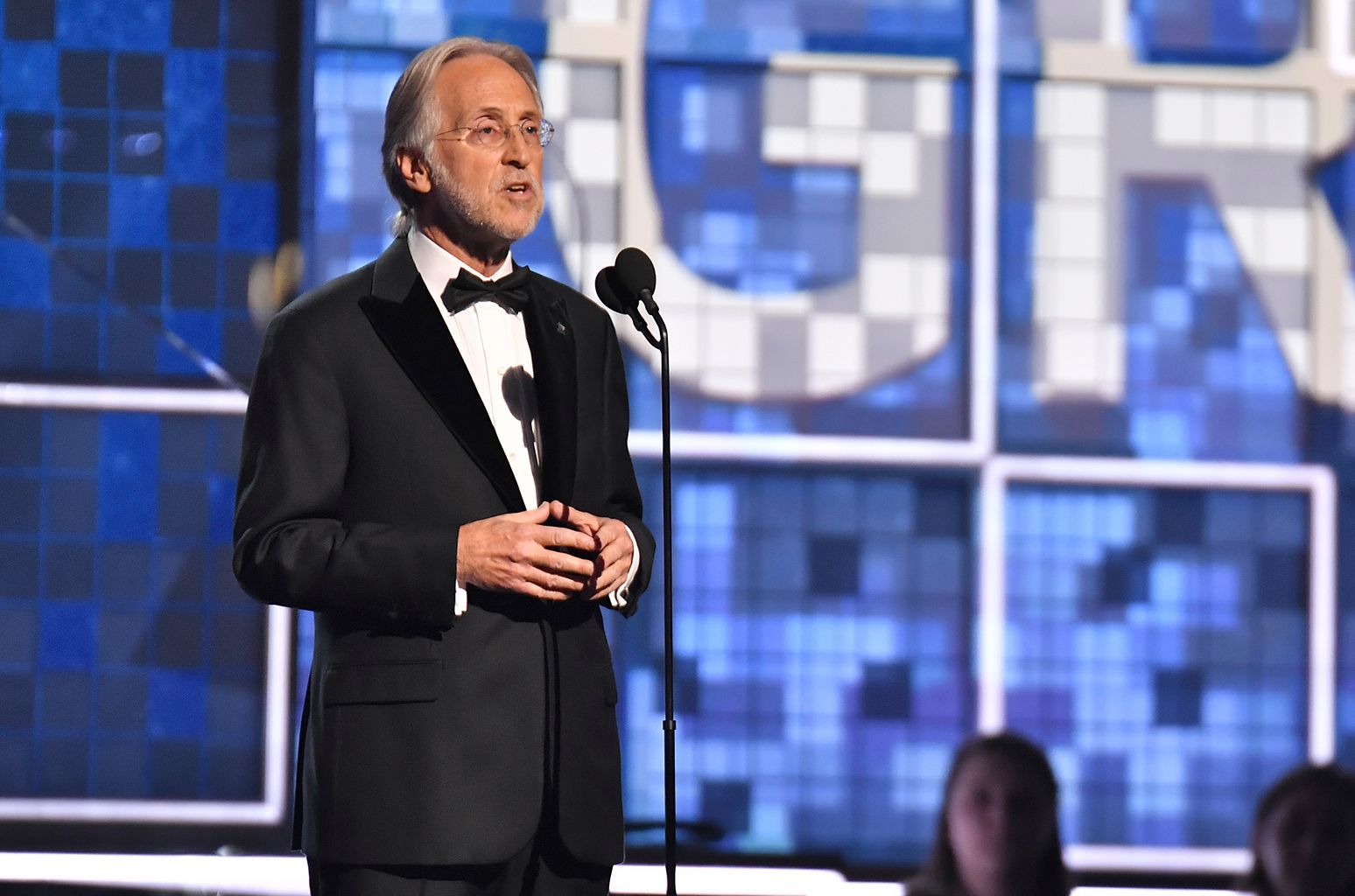
Neil Portnow gives a farewell speech at the 2019 Grammys. Photo by Kevin Winter/Getty Images for The Recording Academy.
His response was not received well, to say the least, and shortly after, Portnow announced he would be stepping down as president in July of 2019. Additionally, the academy announced major changes to the Grammys in an effort to avoid a repeat of last year’s disaster. A Diversity and Inclusion task force was developed and 900 new voting members were invited to join the academy based on the task force’s recommendation. Going further, the Grammy’s four biggest award categories – Album of the Year, Song of the Year, Record of the Year and Best New Artist – were expanded to house eight nominations instead of five. When the nominations for this year’s awards came out, it seemed the Academy might have learned their lesson – women were much more present in all of the major award categories – but it remained to be seen whether the ceremony itself would follow suit.
The Grammys also seemed to be in trouble in the week leading up to its broadcast. Nominated artists Drake, Kendrick Lamar, and Childish Gambino all declined to perform, most likely due to the academy’s tendency to ignore hip-hop in the major categories. Newly-turned pop superstar Ariana Grande also dropped out of performing and publicly criticized Grammys producer Ken Ehrlich for not allowing her to express her “creative freedom.” However, when the 61st Grammys aired Sunday night, the absence of those A-list stars wasn’t felt. Instead, the awards flourished with a crop of new and old talent, who were, surprisingly, mainly women.
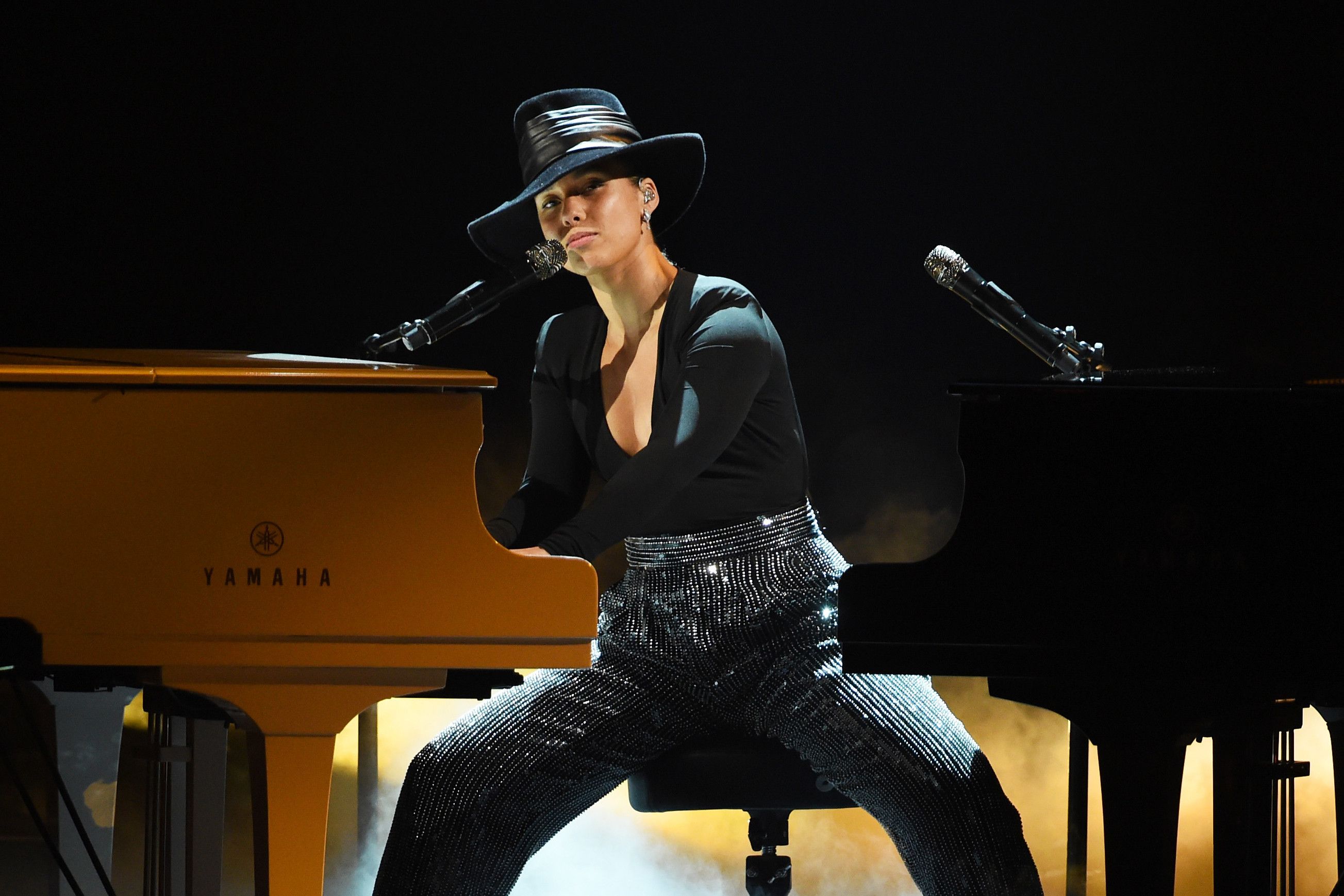
In addition to performing, Alicia Keys performs a medley of songs she wishes she wrote. Photo by Kevin Winter/Getty Images for The Recording Academy.
The entire night boasted a female presence that was so conspicuously different from recent years. For one, Alicia Keys was the host and brought on an air of humility to her role. It was a welcome break from two-time Grammys host James Corden, who muddled the job the last two years with anticlimactic musical numbers and generally unfunny skits. Keys showed off her talents in more ways than one, from playing two pianos at the same time to showcasing her friendship with Michelle Obama; the former first lady made a surprise appearance at the of the show with fellow “bad-ass” ladies Lady Gaga, Jennifer Lopez and Jada Pinkett Smith. “Music shows us that all of it matters…every note within every song,” Obama stated to uproarious applause. This opening monologue set a tone for the night that was hopeful and optimistic, and decidedly, the rest of the night followed through.
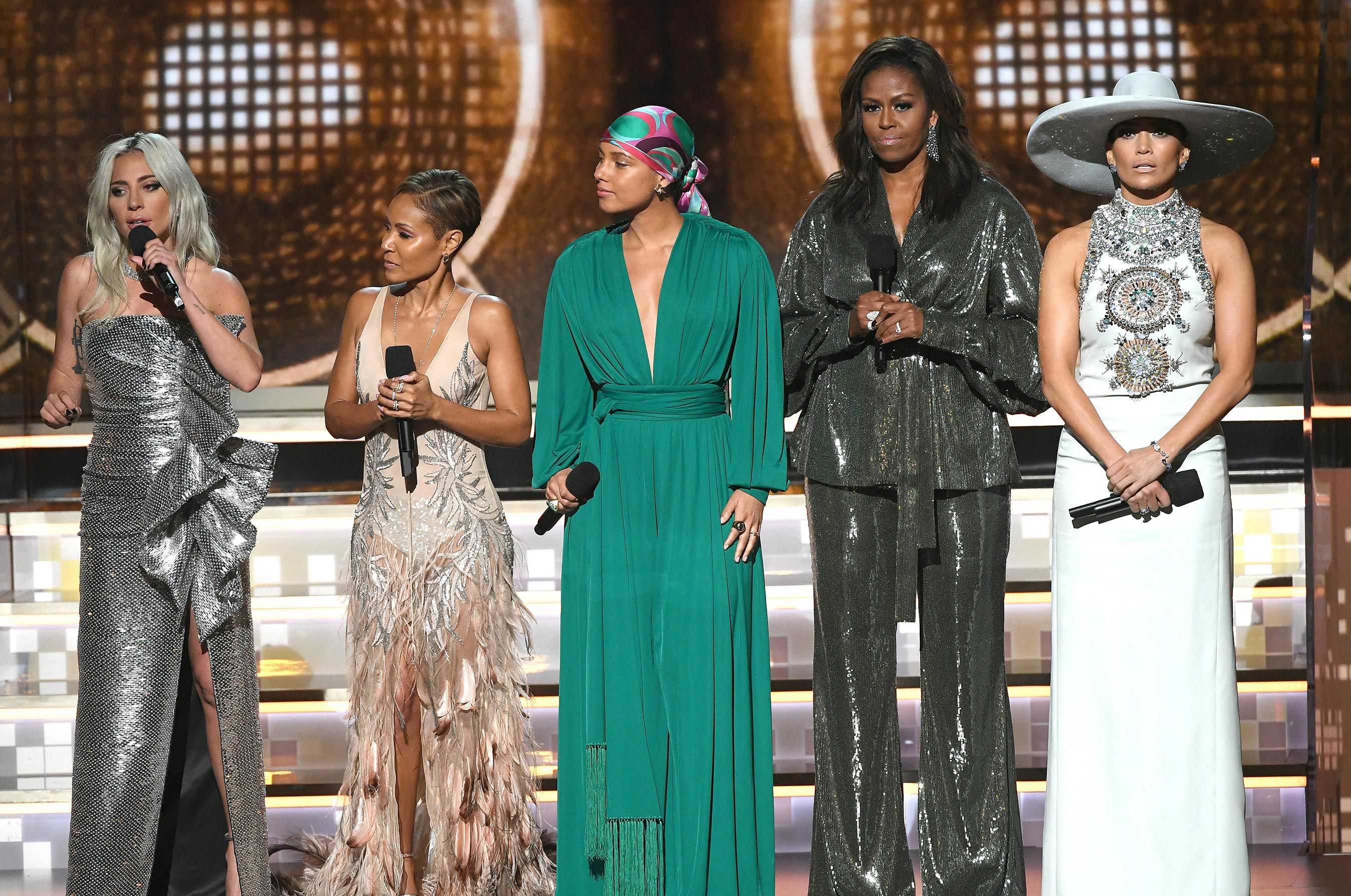
Michelle Obama makes a surprise appearance alongside Lady Gaga, Jada Pinkett Smith, Alicia Keys, and Jennifer Lopez. Photo by Kevin Winter/Getty Images for The Recording Academy.
There were a ridiculous amount of standout performances this year, and unsurprisingly all of them were helmed by women. Some were straight up fun and felt they should have belonged on the Super Bowl stage in place of a shirtless Adam Levine. Janelle Monae’s performance of “Make Me Feel” was astounding and showcased her natural talent for live performance. Complete with funky choreography, guitar licks, and moonwalking, Monae championed “black girl magic” and even brought on dancers wearing pants that looked like a certain female anatomy. She then unabashedly said the words “let the vagina have a monologue” on national television, which really let viewers know that this was not like the Grammys of the past. Another high-energy performance belonged to Cardi B, who became the first woman to receive Rap Album of the Year later that night. Cardi’s rendition of “Money” was a visually gorgeous ode to her love of high fashion and featured a piano player that offered quite a performance on her own.
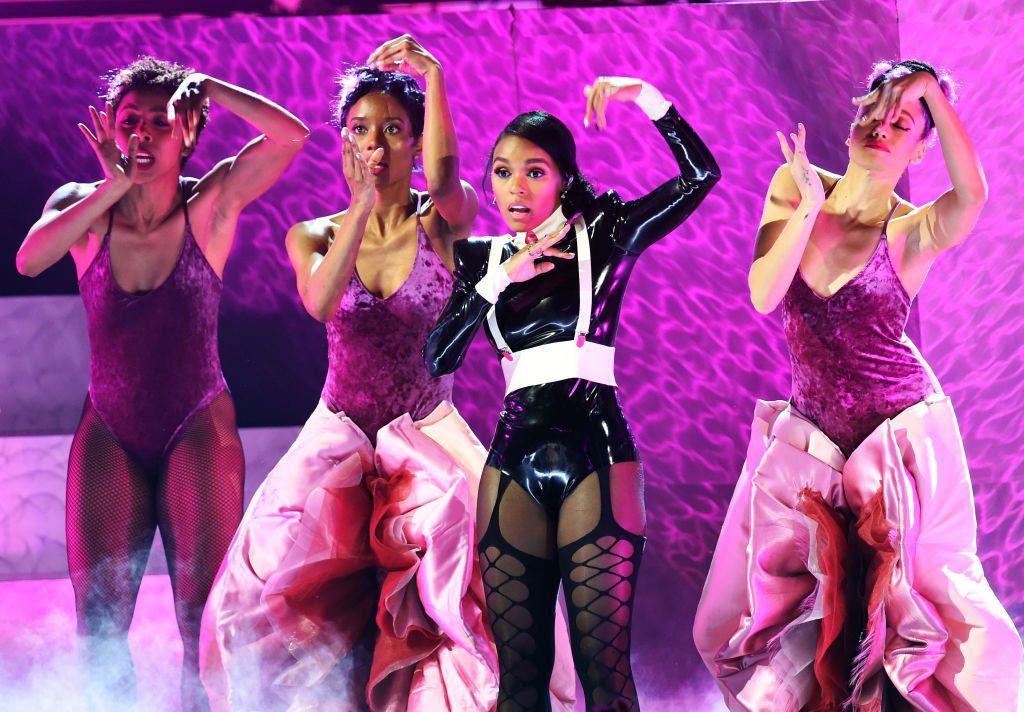
Janelle Monae performs at the 2019 Grammy Awards. Photo by Kevin Winter/Getty Images for The Recording Academy.
Other women brought on a more subtle form of spectacle, illustrating their talents with powerful vocals and stage presence. Kacey Musgraves gave an understated but emotional performance of “Rainbow,” the last track in her critically-acclaimed album Golden Hour, which is seen as an anthem for the LGBTQ community. With her steady, crystal-clear voice, Musgraves showed the world why she deserved the award for Album of the Year. In that same vein was Brandi Carlile, who was nominated for six awards but was probably the least well-known artist of the night. Carlile made the most of her time on screen with a heartfelt and tear-jerking performance of her ode to marginalized people, “The Joke.” Lady Gaga sang a somewhat unexpected version of “Shallow,” bringing the energy of a seasoned rock star and less so of a shy pop vocalist. While it was a bit weird to see her moving her body erratically as she sang the Oscar-nominated track in the style of a rock-opera, it was a classic demonstration of how multi-talented Lady Gaga is as a performer.
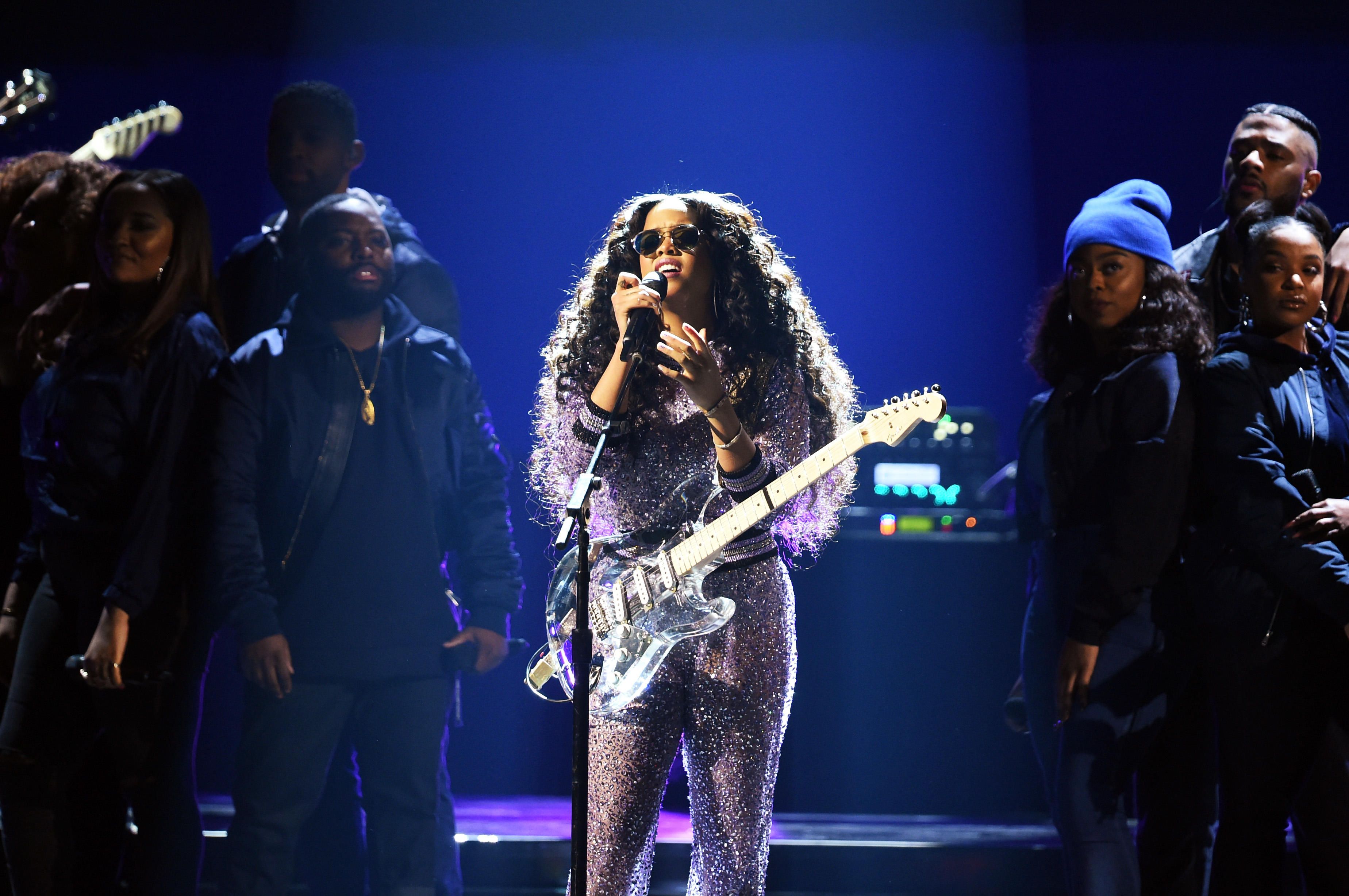
H.E.R. performs at the 2019 Grammys. Photo by Kevin Winter/Getty Images for The Recording Academy.
Alongside the seasoned performers were some new faces, most notably H.E.R., whose voice was raw and full of passion as the R&B songstress performed “Hard Place,” complete with a chorus and violin players. It was her first time on the Grammys stage, but there was no hint of nervousness at all – when H.E.R. broke out into a guitar solo to cheers and whoops from the crowd, it felt like she was where she belonged. R&B sister-duo Chloe x Halle also debuted on the Grammys stage with a gorgeous take on Donny Hathaway’s “Where is the Love,” and an unlikely collaboration between St. Vincent and Best New Artist winner Dua Lipa worked surprisingly well. The two gave an extremely sensual performance as they sang sultry covers of each others’ hit songs “One Kiss” and “Masseduction” while staring deep into the others’ eyes.
There were not a lot of performances by men this time around, and none of them were particularly great. Post Malone and the Red Hot Chili Peppers delivered a bland and anticlimactic set, falling in line with the horrible collaborations that the Recording Academy likes to scrape together every year in order to appease straight, white men. Travis Scott had James Blake and Earth, Wind & Fire as back up in his performance of “No Bystanders,” which was a welcome surprise. However, he was not a captivating performer on screen, despite the fact that he continues to sell out stadiums and raise children with Kylie Jenner.

Diana Ross celebrated her upcoming 75th birthday at the 2019 Grammys. Photo by Kevin Winter/Getty Images for The Recording Academy.
As far as tributes go, most of them were magnificent. Dolly Parton shined on a joyful medley of her familiar honky tonk tunes with her goddaughter Miley Cyrus, country stars Maren Morris and Little Big Town, and Katy Perry. For a 75th birthday celebration, Diana Ross, a true diva, walked onto the stage in a massive and overflowing red ball gown as she proudly proclaimed “happy birthday to me!” (Her birthday isn’t actually for another month.)
Not as good was a tribute to the 60th year of Motown. For some reason, Jennifer Lopez was chosen to carry this show, and while she is a perfectly capable performer, she was a non-black artist performing in a genre that was originally created by black artists for black audiences. It seemed extremely disingenuous of the academy to choose her given that plenty of talented black women were in attendance at the Grammys that night and could have easily carried a Motown tribute such as Alicia Keys, Janelle Monáe and Chloe x Halle. Also somewhat disingenuous was the Aretha Franklin tribute. R&B and soul veterans Fantasia, Andra Day and Yolanda Adams gave an impassioned performance of “You Make Me Feel Like (A Natural Woman),” but it came directly after an in memoriam segment which was in turn preceded by a lengthy tribute to departing Recording Academy head, Neil Portnow, who I doubt anybody wanted to see on stage this year.
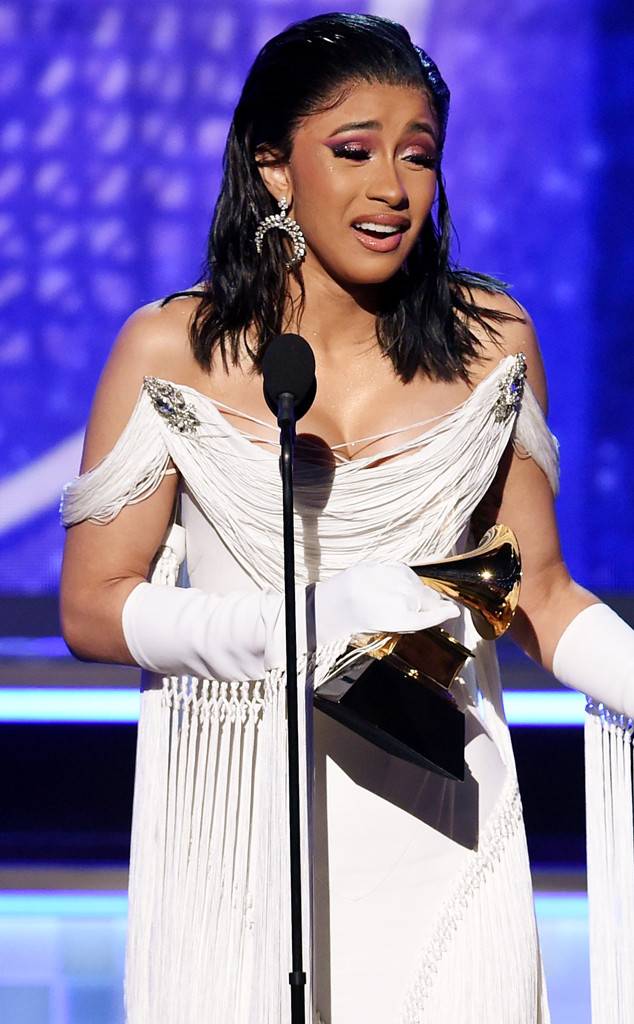
Cardi B is the first women to win Best Rap Album. Photo by Kevin Winter/Getty Images for The Recording Academy.
The majority of the awards given out that night were a surprise to many, as they seemed to accurately reflect the overall theme of what the Grammys tried to represent. Women dominated awards as much as they dominated their performances – Kacey Musgraves won four awards (including Album of the Year), Brandi Carlile took home three, and Cardi B’s win for Best Rap Album was an achievement in its own right. While hip-hop was not as prominent performance-wise, it was still well rewarded. Childish Gambino’s “This is America” became the first hip-hop track to win awards for both Record and Song of the year. Childish Gambino was not present for the awards, though he did appear in a Google Playmoji commercial that aired during the show. Someone who did show up was Drake, who used his time on stage after winning Best Rap Song to advocate against the culture of the Grammys. Notably absent during these award speeches was 21 Savage, who was scheduled to perform before he was detained by ICE. It was extremely weird that the only person who expressed support for the rapper throughout the night was producer Ludwig Göransson, who isn’t even from America.
This year, the Grammys wanted to prove that they had learned from previous years, and it seems like they did. However, small moments in the awards show shed a light into the fact that the Grammys and the Recording Academy alike are still a corporate entity with things other than championing diversity in mind. From the awkward Motown and Neil Portnow tributes to the fact that the cycle of abuse that still exists in the industry was never explicitly mentioned by anyone – instead, Alicia Keys vaguely talked about some academy-led programs for women. Overall, the Grammys tried to atone for their mistakes last year, and for the most part, it worked – though I would say that the reason this worked was not because of its organizers, most of whom are still men. The reason the Grammys were good was because of the achievements of women, who gave amazing performances, passionate speeches, and won awards.